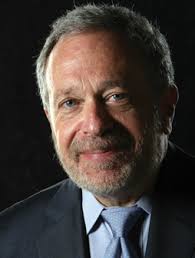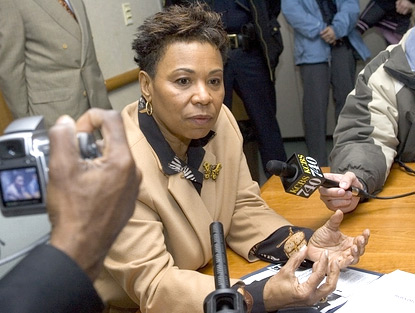The Triumph of Progressivism: Graduation 2013 and 1968
 By Robert Reich,
By Robert Reich,
Robert Reich's Blog | Truthout Op-Ed
May 19, 2013 - Many of you soon-to-be college graduates are determined to make the world a better place. Some of you are choosing careers in public service or joining nonprofits or volunteering in your communities.
But many of you are cynical about politics. You see the system as inherently corrupt. You doubt real progress is possible.
“What chance do we have against the Koch brothers and the other billionaires?” you’ve asked me. “How can we fight against Monsanto, Boeing, JP Morgan, and Bank of America? They buy elections. They run America.”
Let me remind you: Cynicism is a self-fulfilling prophesy. You have no chance if you assume you have no chance.
“But it was different when you graduated,” you say. “The sixties were a time of social progress.”
You don’t know your history.
When I graduated in 1968, the Vietnam War was raging. Over half a million American troops were already there. I didn’t know if I’d be drafted. A member of my class who spoke at commencement said he was heading to Canada and urged us to join him.
Two months before, Martin Luther King Jr. had been assassinated. America’s cities were burning. Bobby Kennedy had just been gunned down.
George (“segregation forever”) Wallace was on his way to garnering 10 million votes and carrying five southern states. Richard Nixon was well on his way to becoming president.
America was still mired in bigotry.
I remember a classmate who was dating a black girl being spit on in a movie theater. The Supreme Court had only the year before struck down state laws against interracial marriage.
My entire graduating class of almost 800 contained only six young black men and four Hispanics.
I remember the girlfriend of another classmate almost dying from a back-alley abortion, because safe abortions were almost impossible to get.
I remember a bright young woman law school graduate in tears because no law firm would hire her because she was a woman.
I remember one of my classmates telling me in anguish that he was a homosexual, fearing he’d be discovered and his career ruined.
The environmental movement had yet not been born. Two-thirds of America’s waterways were unsafe for swimming or fishing because of industrial waste and sewage.
I remember rivers so polluted they caught fire. When the Cuyahoga River went up in flames Time Magazine described it as the river that “oozes rather than flows,” in which a person “does not drown but decays.”
In those days, universal health insurance was a pipe dream.
It all seemed pretty hopeless. I assumed America was going to hell.
And yet, reforms did occur. America changed. The changes didn’t come easily. Every positive step was met with determined resistance. But we became better and stronger because we were determined to change.
When I graduated college I would not have believed that in my lifetime women would gain rights over their own bodies, including the legal right to have an abortion. Or women would become chief executives of major corporations, secretaries of state, contenders for the presidency. Or they’d outnumber men in college.
I would not have imagined that eleven states would allow gays and lesbians to marry, and a majority of Americans would support equal marriage rights.
Or that the nation would have a large and growing black middle class.
It would have seemed beyond possibility that a black man, the child of an interracial couple, would become President of the United States.
I would not have predicted that the rate of college enrollment among Hispanics would exceed that of whites.
Or that more than 80 percent of Americans would have health insurance, most of it through government.
I wouldn’t have foreseen that the Cuyahoga River – the one that used to catch fire regularly – would come to support 44 species of fish. And that over half our rivers and 70 percent of bays and estuaries would become safe for swimming and fishing.
Or that some 200,000 premature deaths and 700,000 cases of chronic bronchitis would have been prevented because the air is cleaner.
Or that the portion of children with elevated levels of lead in their blood would have dropped from 88 percent to just over 4 percent.
I would not have believed our nation capable of so much positive change.
Yet we achieved it. And we have just begun. Widening inequality, a shrinking middle class, global warming, the corruption of our democracy by big money – all of these, and more, must be addressed. To make progress on these — and to prevent ourselves from slipping backwards — will require no less steadfastness, intelligence, and patience than was necessitated before.
The genius of America lies in its resilience and pragmatism. We believe in social progress because we were born into it. It is our national creed.
Which is to say, I understand your cynicism. It looks pretty hopeless.
But, believe me, it isn’t.
Not if you pitch in.
This piece was reprinted by Truthout with permission or license. It may not be reproduced in any form without permission or license from the source.
ROBERT B. REICH, Chancellor’s Professor of Public Policy at the University of California at Berkeley, was Secretary of Labor in the Clinton administration. Time Magazine named him one of the ten most effective cabinet secretaries of the last century. He has written thirteen books, including the best sellers “Aftershock" and “The Work of Nations." His latest, "Beyond Outrage," is now out in paperback. He is also a founding editor of the American Prospect magazine and chairman of Common Cause.
Show Comments
Read More...
Summary only...










 A new Pew Research Center study suggests this pattern may well continue in 2012. Millennial voters are inclined to back President Barack Obama by a wide margin in a potential matchup against former Massachusetts Governor Mitt Romney, while Silent generation voters are solidly behind Romney. Baby Boomers and Generation X voters, who are the most anxious about the uncertain economic times, are on the fence about a second term for Obama.
A new Pew Research Center study suggests this pattern may well continue in 2012. Millennial voters are inclined to back President Barack Obama by a wide margin in a potential matchup against former Massachusetts Governor Mitt Romney, while Silent generation voters are solidly behind Romney. Baby Boomers and Generation X voters, who are the most anxious about the uncertain economic times, are on the fence about a second term for Obama.


![[PDA - Heathcare NOT Warfare - Sign the Petition.]](http://pdamerica.org/images/ads/HealthNotWar_final.jpg)


